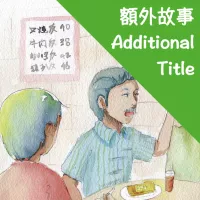父 「 子 」
禮拜六 , 朝早 六 點 半 , 我 起身 去 廁所 。 行 過 客廳 , 老豆 已經 起 咗 身 , 開 住 電視 , 坐 喺 梳化 睇 新聞 。 「 早晨 啊 阿仔 。 」 佢 喺 機場 做 維修 , 日日 返 十幾 個 鐘頭 。 照計 呢個 時間 , 佢 應該 已經 出咗門 返工 。 「 …… 早晨 。 」
去 完 廁所 , 諗 住 返 房 繼續 瞓 : 我 頭先 打機 打 到 四點 先 瞓 。
「 阿仔 呀 ?」
「 做咩 ?」
「 不如 陪 老豆 去 食 個 早餐 ?」 吓 , 咁 突然 ?
「 你 唔係 要 返工 咩 ?」
「 我 今日 請咗 假 。 」 老豆 係 工作狂 , 責任心 好 重 , 我 未 見 過 佢 請假 。
「 你 想 食 嘅話 都 得 嘅 …… 」 我 當 去 食 宵夜 。
刷 好 牙 , 洗 完 面 , 換 埋 衫 , 先至 六點十 。
「 你 諗 住 去 邊 間 ?」
「 冇所謂 啊 , 你 揀 ?」 於是 我 帶 咗 老豆 去 街口 嗰 間 茶餐廳 , 夠 近 , 而且 得 佢 開 咁 早 。 一 坐低 , 老豆 就 遞 咗 個 餐牌 畀 我 : 「 睇 下 想 食 啲 咩 ?」
「 我 諗 好 咗 㗎 喇 。 」
「 咁快 ?」
「 我 成日 嚟 , 記得 晒 有 咩 食 。 」
「 哦 , 係 呀 …… 好 好食 㗎 ?」
「 唔差 。 」
我 嗌 咗 一 碗 沙嗲 牛肉 麪 , 飲 凍 檸水 ; 佢 嗌 咗 一 碗 腿蛋通 , 飲 凍 奶茶 。 佢 好似 好 鍾意 飲 奶茶 , 屋企 擺 咗 一 包包 奶茶粉 , 我 每 朝 起身 都 會 見到 垃圾桶 有 一 包 。
「 伙記 , 加 多 份 西多士 吖 !」
「 你 好 肚餓 ?」
「 唔係 呀 , 我 驚 你 唔夠 飽 吖 嘛 。 」
「 我 一 碗 麪 夠 㗎 喇 。 」
「 欸 , 多士 可以 兩 份 食 嘅 啫 !」
啲 嘢食 好 快 到 , 然後 我哋 都 食 得 好 專心 , 一 句 偈 都 冇 傾 , 氣氛 有啲 尷尬 。 最後 係 老豆 第 一 個 出聲 : 「 你 真係 夠 飽 ?」 佢 已經 切 好 份 西多士 , 留 咗 半 份 畀 我 , 但 我 始終 都 冇 掂 過 份 多士 。
「 OK 啊 , 夠 㗎 喇 。 」 等陣 食 太 飽 就 唔使 瞓 喇 。
「 哦 …… 噉 我 食 埋 佢 啦 。 」 印象 中 佢 好似 好 憎 人 食 淨 嘢 。
「 呢度 啲 嘢食 真係 唔錯 , 唔怪之得 你 —— 」
「 埋單 囉 ?」 我 打斷 咗 老豆 , 佢 亦 窒 咗 窒 : 「 吓 ! 而家 先 七點八 , 好 早 咋 喎 ! 不如 陪 老豆 踩 返 轉 單車 哩 ?」 我 平時 成日 約 人 踩 單車 , 屋企 都 擺 咗 架 幾 貴 嘅 單車 。
「 啱啱 至 食 飽 , 唔踩 喇 。 」
「 噉 …… 一係 去 公園 散步 ?」
「 我 真係 有啲 攰 , 想 返 屋企 瞓覺 。 」
老豆 冇 再 講 啲 咩 , 就 攞 咗 張 單 去 埋 。 返 到 屋企 , 我 直接 返 房 攤上 床 , 望 住 天花板 —— 嗰陣 啱啱好 八點 。 老豆 成 朝 都 好 古怪 。 定係 佢 份 人 不嬲 都 係 噉 , 只係 我 見 得 佢 太 少 , 唔 了解 佢 ?

